End of the Road for Etgar 36 Summer Bus Trips
A parent wonders "who/what will fill the vacuum for future generations of teens."
Dave Schechter is a veteran journalist whose career includes writing and producing reports from Israel and elsewhere in the Middle East.
The wheels on the Etgar 36 bus have stopped going ‘round and ‘round.
Over 20 summers, Billy Planer took more than 600 teenagers on a multi-week, cross-country journey, exploring history, culture, contentious issues — all the while teaching the value of listening for the sake of conversation rather than confrontation.
This summer’s was the last. “This was maybe the perfect summer. It felt like pitching a perfect game,” Planer, Etgar’s founder and director, said, relaxing in his “office,” a Decatur coffee shop.
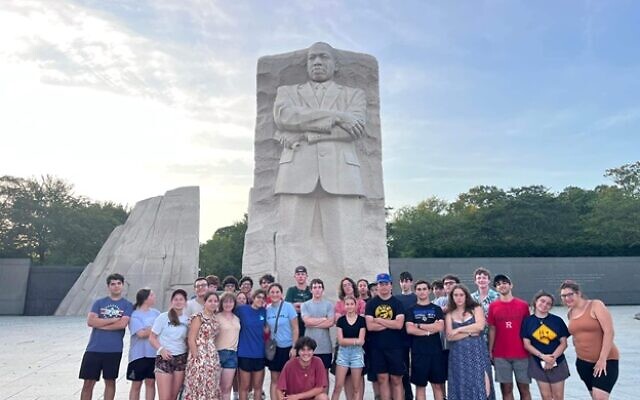
Etgar’s multi-day civil rights history tours, meanwhile, continue to grow in popularity.
The name Etgar 36 combines the Hebrew word for “challenge” and the “double chai” of being Jewish and American, as well as “realizing that our lives are connected to other people,” Planer explained.
“The whole trip is based on, you’ve got to open yourself up and be vulnerable. They’re sharing their thoughts and their feelings and they’re seeing heavy stuff. Every kid loses it throughout the trip. You can’t go to the Oklahoma City bombing memorial at night and not be ripped apart,” he said.
The whole trip is based on, you’ve got to open yourself up and be vulnerable. They’re sharing their thoughts and their feelings and they’re seeing heavy stuff. Every kid loses it throughout the trip. You can’t go to the Oklahoma City bombing memorial at night and not be ripped apart.
The COVID pandemic forced cancellation of the 2020 trip, making 2023’s the 20th. One of this year’s passengers calculated that the trip covered some 10,500 miles. Multiplied by 20 years, that would be 210,000 miles (for reference, the moon is 238,900 miles from Earth).
Planer, 56, attended the Hebrew Academy and Ahavath Achim Synagogue, where he later served as youth director for 11 years and developed the prototype for the summer trip.
One inspiration was the 1993 book “The Majic Bus/An American Odyssey,” historian Douglas Brinkley’s account of a six-week, cross-country bus trip with university students, with an emphasis on history and culture. “I read that, and I said, ‘I want to do that,’” Planer recalled.
Between 30-40 teens, almost all Jewish, annually took seats in the bus. [Disclosure: The author’s oldest son was a passenger 15 years ago.]
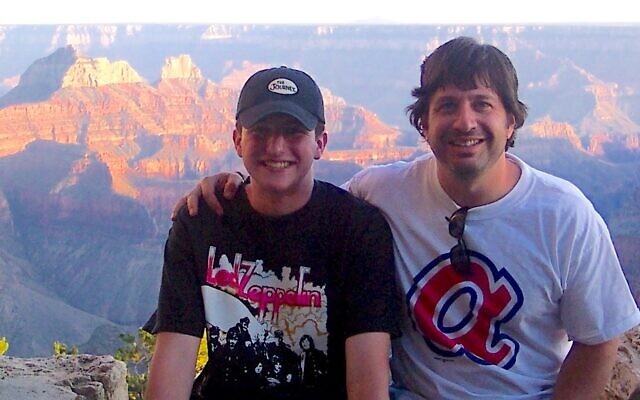
Jon Mitchell, now 36, was on the first trip, in 2003. “Going on a cross-country search for the soul of America at that age definitely got me hooked on that search, but it was also just the idea of starting an alternative to the institutional mainstream that stuck with me,” he said. “I was very conscious even at the time that we were on the first trip, and that Billy had just had a crazy idea and wanted to try it — and that he wanted to be as far from ‘the usual’ in the Jewish world as I did. I sort of gave myself permission after this to be an unconventional adult, not just an outsider kid. It was very formative.”
This year’s trip began June 25 in Atlanta, and the next day in Alabama, with a focus on the Civil Rights movement. The bus rolled through the South, the lower Rocky Mountain states, and the Southwest, before reaching California the second week of July. The teens (minus several who dropped off after the West Coast) flew from San Francisco to Chicago, where they caught up with the bus, which had gone ahead while they explored the Bay Area. The second leg took them to the East Coast, wrapping up July 31 in Washington, D.C.
History lessons were imparted at, among other places: the Edmund Pettus Bridge in Selma, Ala.; the Lorraine Motel in Memphis, where the Rev. Martin Luther King was assassinated; Dealey Plaza in Dallas, where President John F. Kennedy was assassinated; Tulsa’s Greenwood District, where in 1921 a white mob killed hundreds of African-Americans and burned “the Black Wall Street;” Grant Park in Chicago, site of anti-Vietnam War protests during the 1968 Democratic national convention; Kent State University, where Ohio National Guard troops killed four students in 1970; and Independence National Historic Park in Philadelphia, where the United States was founded in 1776.
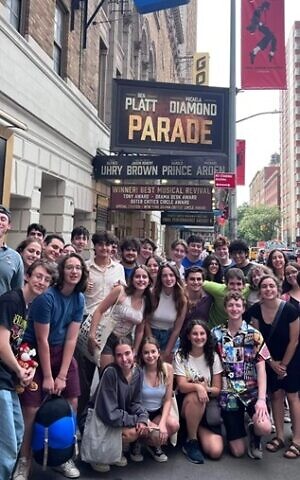
Over the years, the teens heard from abortion rights advocates and anti-abortion activists; gun rights advocates and a father whose son was slain in the Columbine High School massacre; opponents and supporters of “marriage equality;” liberal and conservative groups with differing views on economic opportunity and wealth disparity; J Street and AIPAC (American Israel Public Affairs Committee) about Israel; members of Congress (including Sen. Jon Ossoff, who, as a teenager, created Etgar’s first website); and, on numerous other subjects, from people across a spectrum of political, religious, and economic philosophies.
“We have a bedrock of issues, but this year we added AI [artificial intelligence] and [AI-driven language processing tool]. We also added psychedelics,” Planer said.
Planer prepped the teens before each session, discussing the topic and the speaker, always reminding them: Listen to understand rather than to win an argument.
“What I’ve heard anecdotally, a lot, from parents, that what they appreciate the most is at the end of all this, their kids are not scared to show up on a college campus,” Planer said. “Go to a Jewish parent. What are Jewish parents so afraid of on the college campus? Palestinian kids. What do I hear from my alumni parents? ‘My kid walked right up to the Palestinian organization and said, let’s talk.’ They’re not afraid of them. They don’t see them as the enemy. They see them as just somebody with a different point of view.”
The cost — $5,000 in 2003, $9,000 this year — rose with hotel prices and the expense of operating the bus. With scholarships, “We never had a kid not go due to costs,” Planer said.
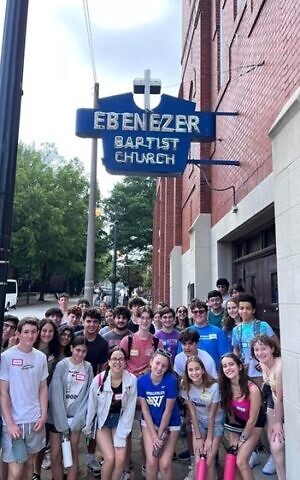
Planer had a front row seat to the lives of teenagers, who today “are more connected to information and access to people and ideas, so kids on the trips now are doing way more research before they’re talking to somebody,” he said. “They feel their opinion matters.”
Connecting that “double chai” of being Jewish and American, Planer said, “I think they like hearing that Judaism has something to say” about issues important to them. “They’re not making the argument that ‘this is Jewish and that’s not,’ which is what Etgar is all about, not making that break.”
Planer’s perspective also changed.
“The older generation bemoans them and their phones,” but he sees adults likewise fixated. “I used to think, when I would see four kids sitting together and they’re all on their phones, I was like, you are all being rude to each other. They didn’t see that. So, I had to shift my mind to be like, it’s different ways. There is no one way to socialize.”
Today’s teens are coping with a lost year of in-person education and socialization.
“I don’t think we understand the impact of COVID, yet,” Planer said. “I think all kids have slid back a year, emotionally, and stability-wise. I think it’s mammoth and I think we’re seeing the tip of the iceberg, for the anxiety that we don’t even acknowledge. And, by the way, I think it’s adults, too.”
Planer also observed Jewish teens “plugging back into religion, but not in the old school way . . . although more of the kids on the last few trips have wanted to go to synagogue on Friday nights,” which he attributes to the Jewish camp experience.
“That intrigues me, because Etgar is not a religious trip.” That said, varying forms of Jewish worship were part of every Shabbat on the road.
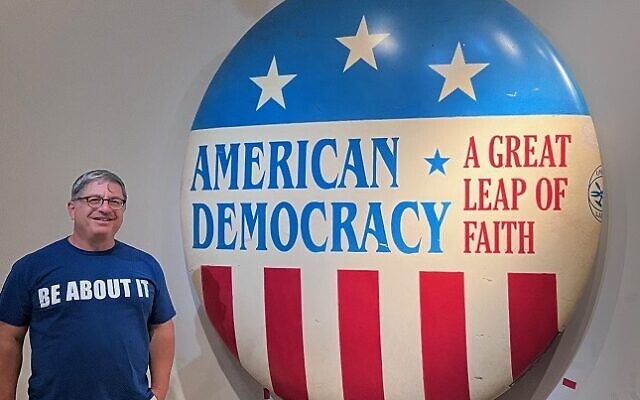
Planer expects to miss “the intensity of . . . having the important discussions. It’s being with a group of vital young adults that are open to having uncomfortable encounters and learning from it and being part of it.” He’s forged friendships with many of the speakers who met with the teens.
As he talked on a Tuesday, Planer was eager to hit the road again that Sunday — to attend Bruce Springsteen concerts in the Northeast. He has seen more than 100, including a couple that coincidentally fit into summer bus trips. “I’ve got to support them. He’s been waiting for me to show up in Europe. That’s why he keeps going, I’m convinced,” Planer joked.
The summer trips are one part of Etgar. Since 2004, Etgar also has taken more than 30,000 people on three- and four-day Civil Rights tours. More than 50 are scheduled through the end of this year and more than 70 are booked for 2024.
Depending on the schedule, itineraries take in Atlanta, Birmingham, Selma, and Montgomery, home of the Equal Justice Initiative Legacy Museum and Memorial to lynching victims.

These trips have attracted congregations from around the country and an increasing number of Jewish federations and organization boards, as well as groups of friends joining together.
Planer credits Etgar’s full-time staff and summer assistants for making the whole thing work.
In a valedictory note on the teen trips, Planer wrote on Facebook:”To watch an idea that I had play out in real life and have it be engaged with by so many people has surpassed my wildest dreams.”
One teen, after dinner with his grandparents at a New York City restaurant, wrote in the 2023 trip online journal: “I couldn’t love my grandparents more, but I disagree with them quite a bit regarding politics. Yet we had a great political conversation for the first time in so long, and I used the skills I learned on Etgar to help myself have the discussion.”
A parent’s tribute on Facebook read: “This is the greatest gift of 20 years of Etgar 36; teaching teens (including our son) to listen to both sides of an issue. They don’t need to agree with the ‘other side,’ but they need to have the courtesy and respect to listen to the other side, and have a civil discourse. I truly don’t know if anyone else is trying to impart this lesson on teens. They certainly don’t get it in the standard school system. I wonder who/what will fill the vacuum for future generations of teens once you ‘get off the bus’? I certainly hope someone does. If not, maybe someday one of your young protégés may decide to get back on the bus.”
- News
- Community
- Dave Schechter
- Etgar 36
- Billy Planer
- COVID pandemic
- Hebrew Academy
- Ahavath Achim Synagogue
- The Majic Bus/An American Odyssey
- Douglas Brinkley
- Jon Mitchell
- Edmund Pettus Bridge
- Lorraine Motel
- Rev. Martin Luther King
- Dealey Plaza
- John F. Kennedy
- Greenwood District
- Black Wall Street
- Kent State University
- Independence National Historic Park
- J Street
- American Israel Public Affairs Committee
- Sen. Jon Ossoff
- Bruce Springsteen
- Equal Justice Initiative Legacy Museum and Memorial



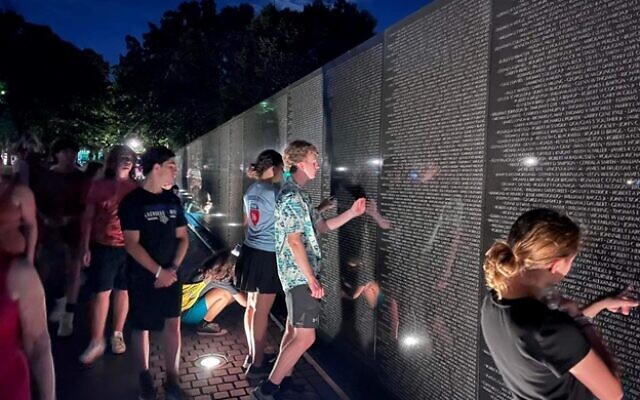
comments